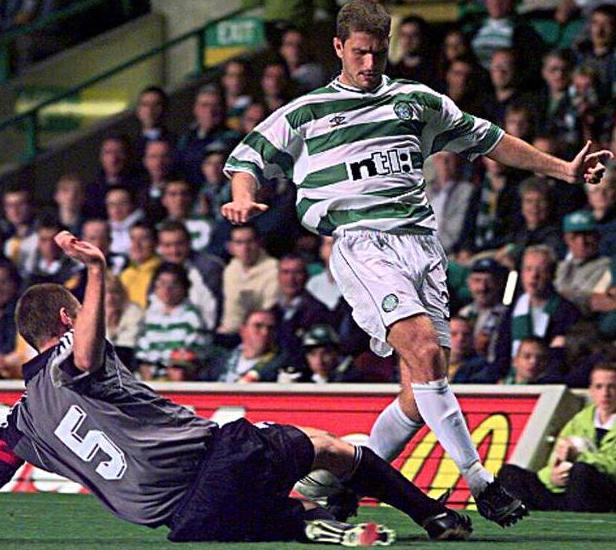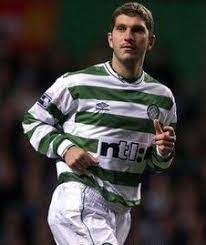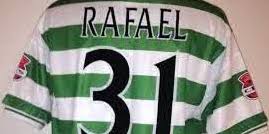CELTIC fans were rightly excited when the club announced the signing of a Brazilian international defender in December 1999.
It appeared to be the club’s signing coup of the century.
Didn’t quite turn out that way, alas.
Celtic book author Alex Gordon, a former Sunday Mail sports editor when the journal was the biggest-selling title in the country, investigated the record-breaking deal.
Alex, who has written 15 Celtic tomes, covered the tale of the most extraordinary transfer in his second book of newspaper memoirs, ‘A Raccoon Stole My Thunder‘, which was published by Ringwood in November 2021.
In another CQN EXCLUSIVE SERIES, we track the most bizarre and puzzling move in Celtic history.
Please enjoy!

THE fictional occupier of 221b Baker Street would have been stumped. Without a shred of argument, the most mystifying transfer deal in Scottish football history concerns Celtic and Brazilian defender Rafael Scheidt.
In December 1999, the club announced they had paid £4.8million to bring the 23-year-old international centre-half to Parkhead.
Rafael Who? The media and the fans eagerly sought knowledge of the individual who appeared to be one of his nation’s best kept secrets.
I was MD at 7 Day Press, Scotland’s most prominent sports/news agency at the time, and I immediately released one of my most intrepid reporters on the trail of the rather anonymous South American ‘superstar’.
Craig Swan, who later joined my old newspaper the Daily Record, took on the task with his usual fervour.
The deal was worthy of a little more investigating than the usual bumf provided by the club who had just paid a Scottish record fee for a defender, and a fairly obscure one at that. The press was informed Celtic had outbid AC Milan for the player. Bold statements such as that provoke examination.

NOW YOU SEE ME…Rafael Scheidt is action against Luxembourg outfit Jeuenesse D’Esch in a rare first-team appearance.
These were exciting times for the club who, in the summer, had also welcomed back the legendary Kenny Dalglish in a management post, director of football operations or something equally dotty.
His former Liverpool team-mate John Barnes, a seventy-nine times-capped England international forward, accepted the role as first team coach, his first such assignment at this level. They were introduced as ‘The Dream Team’.
Celtic had also smashed their all-time transfer ceiling by paying £5.75million to West Ham for Israel international midfielder Eyal Berkovic during the pre-season. The supporters of the east end of Glasgow outfit were a tad animated. And who could blame them?
A young Latin American player was coming to the club after agreeing a four-and-a-half year deal. He was no big-name has-been topping up his pension.
The Hoops hierarchy did not go into the specifics of his ‘lucrative deal’, but I was reliably informed the wages were in the region of £20,000-per-week which would have placed him in the top ten highest-paid players in the history of the club.
Well, you have to pay top dollar for the best, haven’t you? Scheidt had been capped sixteen times by Brazil, we were informed. Really? My guy Craig was on the case.
We discovered thirteen of those appearances were for the Olympic team. So, not quite rubbing shoulders with Ronaldo, Cafu or Roberto Carlos, then?

ON THE MOVE…Rafael Scheidt in action.
The three full caps were awarded in nondescript, inconsequential friendlies. But diddy players didn’t get to play for Brazil, did they? Remember, folks, we are talking about the country that had won the World Cup on four occasions at that stage.
Coca-Cola, a soft drinks company with a product with which I am not acquainted, sponsored Brazilian football for decades and part of the contract was for the international team to play games all over the nation. They demanded value for money, too.
In 2012, one of the country’s greatest players, Ronaldinho, lost his £500,000-a-year contract as an ambassador for Coke, the fizzy drinks variety, after he was caught drinking Pepsi at a press conference.
The enraged company fired out a statement pronto informing everyone: ‘Coca-Cola recognises the career and value of Ronaldinho. However, due to recent developments it has become impossible to continue the partnership.’
Half a million smackeroos gone just like that. It’s true, loose lips sink sponsorships.
Meanwhile, back at the Scheidt escapade, there were also suggestions some performers were handed caps as sweeteners to clubs who looked to offload players to Europe.

As well as bumping up the asking price, an outing in the famous yellow and blue strip was advantageous when work permits were required before such moves could be rubber-stamped. Corruption in football? Surely not!
As it happened, Scheidt did, in fact, need the government green light which he duly received on December 21 a week after he had passed a medical at Celtic.
Interestingly, Barnes, when quizzed on the qualities of the hitherto incognito newcomer, revealed he had never actually witnessed the player in action. Quickly, he added: ‘I have seen some impressive video clips.’ Hmmmm. How about King Kenny? Nope, he hadn’t been treated to any virtuoso performances from the Samba superstar in the flesh, either.
Presumably, the director of football had also been enthralled by Scheidt’s showings on tape where his agent had obviously selfishly – and cunningly – thought to just show the best bits. The multi-million pound plot thickened.
TOMORROW: Don’t miss The Curious Case of Rafael Scheidt (Part Two)

